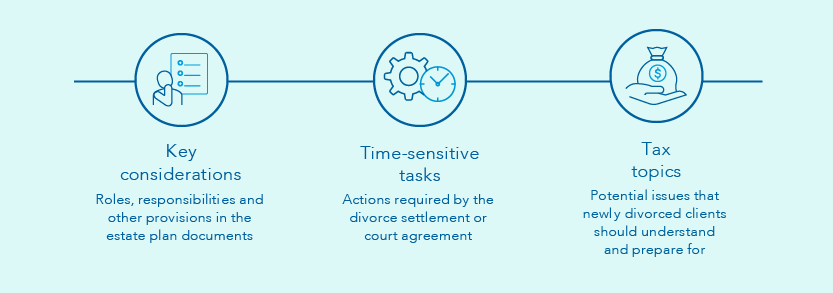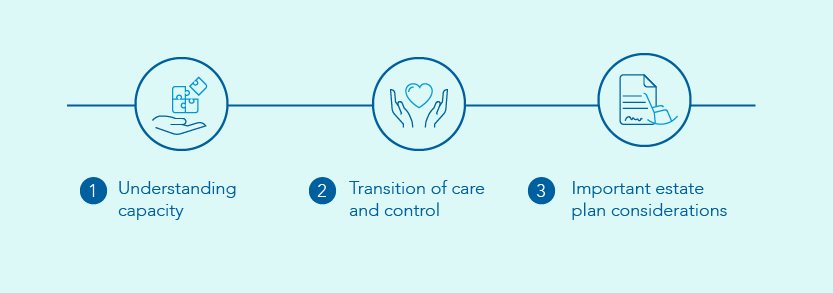$84.4
trillion will be either transferred to heirs or donated to charities over the next 20 years1
60%
of clients first engaged with an advisor after a life event2
1 in 5
Gen Zers hired a financial advisor after a death in the family and/or receiving an inheritance2
22%
of Millennials hired a financial advisor because of a marriage or divorce2

“The transfer of wealth from one generation to the next typically takes place in connection with life events which naturally represent significant financial milestones for clients,” says Leslie Geller, wealth strategist at Capital Group. “Preparing for those moments and having go-to resources to inform your guidance can help you educate your clients at these critical points. It also represents an opportunity to capture some of those assets when money is in motion.”
Leslie Geller, Wealth Strategist at Capital Group
Each of these milestones presents an opportunity to engage and add value. And we have resources to help you do so. Just CLICK on a link to learn more:
For parents, there’s the time before children then everything that comes after. Part of what comes after is the need to answer an urgent if slightly morbid question: What happens to this baby if we aren’t here to provide and care for them?
Newly activated parental instincts can motivate clients to put in place the building blocks to safeguard their children’s futures as well as their own. That often means establishing a will and updating beneficiaries on existing accounts. It may also mean starting an estate plan.
Advisors can collaborate with estate planning experts to shepherd new parents through that process. For example:
- Are there essential documents in place?
- Has an executor/trustee/guardian been appointed? (And do clients know the role each will play?)
- Are there new or continuing trusts for child(ren)?
- Is life insurance needed?
Go deeper:
Getting married or remarried
It’s easy for financial considerations to get swept aside in the march to the altar. After all, what couple wants to talk money, let alone ponder divorce, as they’re preparing to bless their union?
Yet few life events have more far-reaching financial implications than marriage. Advisors can help increase the odds of long-term harmony by guiding clients and clients-to-be through sometimes challenging premarital conversations. And because a prior marriage doesn’t necessarily make clients wiser in matters of matrimonial finance, involving an advisor can benefit those getting remarried as well.
For advisors providing guidance, there are four key areas to consider.
- What is each partner’s financial picture: What are their assets, income and debts, what are their pre-existing financial obligations related to their previous marriage and what’s the plan for sharing future expenses?
- Have they considered a prenuptial agreement? This is a tough topic but is useful in setting expectations and getting challenging issues out on the table. Post-nuptial agreements, which outline how assets and liabilities will be divided in the event of divorce, may also be worth considering.
- What’s the estate plan? Does the existing estate plan account for any changes that the marriage might bring?
- Have they considered the financial impact of blending families? For example, how will existing beneficiaries be impacted by potential new ones?
Saving for education/kids to college
For most families, a college acceptance also means accepting significant financial obligations. And between selecting the right savings vehicle, navigating the financial aid process, keeping the account properly allocated and optimizing the withdrawal strategy, things can get complex.
Simply starting the conversation can help clients understand the benefit of saving early. Even if you are not well-versed in the intricacies of the financial aid process, knowing the ins and outs of savings vehicles such as 529 plans along with the benefits of long-term investing can be valuable. As children near college age, third-party resources like studentaid.gov and savingforcollege.com can be highly useful for clients and advisors alike.
And 529 plans have the added benefit of being great vehicles for high net worth clients looking to gift assets in a tax-smart way.
Recently divorced or divorcing
Those living through the end of a marriage have more to resolve than strong feelings. Pulling apart a couple’s intertwined financial life and securing their individual futures takes specialized knowledge and careful attention to detail. Advisors can play a pivotal role by helping clients address key considerations, aid them in tackling time-sensitive tasks required by settlement and court agreements and educating them on tax matters.

Consider estate planning. While it’s generally true that estate planning documents remain in effect after a divorce, your client’s wishes may have changed or new needs may arise.
Taxes are another key consideration as they touch issues from gifts and estates to income, alimony and child support. Rules governing these have evolved over time and vary by jurisdiction so involving tax professionals like CPAs and estate planning attorneys (in many cases those representing both parties) is crucial.
Exiting a business
Owning a business can be all-consuming, which means a client’s decision to exit their business is likely to have widespread professional and personal ramifications. Advisors able to provide help on both fronts can help smooth the transition and earn the appreciation of clients.
Advisors looking to provide sound counsel to those exiting a business should focus on five areas:
- Preparing the client’s finances: Understanding the client’s personal financial picture can help you understand how a sale will support their needs and objectives.
- Getting the business ready: Best done before selling is being contemplated, this represents an opportunity to learn more about the business and helps value and position it in order to optimize the sale price.
- Get the sale details ready: When clients are ready to sell, you can be there to support the formal valuation effort and consult on the terms of the sale.
- Providing guidance when the buyer is family: “Keeping it in the family” is great but it comes with its own challenges and an additional set of tax considerations. As a neutral party, you can help deliver tax-smart and equitable outcomes.
- Get the clients psychologically and emotionally ready: In handing over the keys to the enterprise, owners are giving up something of themselves. Advisors can help navigate the transition by providing a framework for thinking through what’s next.
Go deeper:
Caretaking for elderly parents
Not all life events are experienced firsthand. Some arise from transitions affecting those we care about. Elderly or infirm parents are a notable example.
For clients, the question of when and how to intercede on behalf of aging parents is a delicate one. And although physical care should be the primary concern, managing and protecting finances is a close second. An outdated estate plan, a financial agent with improper motives, a successor trustee verging on incapacity could all prove problematic and potentially lead to family strife.
Guiding clients through a role reversal
Advisors can provide insight in three key areas:

Helping clients understand things like capacity vs. incapacity, ensuring parents’ estate plans are well-constructed and up-to-date, and guiding clients toward the available federal and state benefits programs can lend support to children — and dignity to parents — during any stage of life.
And remember, the reversal of the caregiver dynamic between parent and child is a significant transition and it can be a difficult one for your clients to navigate, making the support you provide especially valuable.
Go deeper:
Receiving an inheritance
Receiving an inheritance is the kind of financial event that can change lives. But it typically comes at the cost of losing a loved one. Amid the swirl of emotions, clients may not envision the complexities they’ll encounter before and after the money arrives.
Advisors are often among those first contacted by the family of the deceased which positions them to help recipients understand the financial implications of an inheritance and alert them to important and time sensitive considerations to discuss with estate planning and tax professionals.
Client’s first questions upon learning of an inheritance
Advisors can provide guidance on navigating the wealth transfer process.

Go deeper:
Retirement
The retirement cliché of the engraved gold watch, congratulatory cake in the conference room and sendoff straight to the golf course needs retiring. Because things have changed. Retirement is no longer a time for slowing down or sitting around. Instead, many view it as a time of reinvention, renewed vitality and deep introspection.
To be sure, advisors must be prepared to answer on topics such as Social Security and Medicare. But retirement planning discussions must range beyond withdrawal rates and required minimum distributions. Because although financial security is a cornerstone of any retirement plan, equally important to many are social life, health, values and legacy.
A holistic retirement planning framework that helps one see a client’s full retirement picture can help advisors uncover client goals and motivations and enable advisors to support the full range of client objectives.

For advisors, supporting clients with expert guidance during life’s most pivotal moments is an immensely gratifying part of the job. The impact of their advice can be measured in things like college diplomas, fulfilling retirements and charitable legacies. And when done right, it can also be seen in the growth and long-term health of their own practices.
1 “Half of Consumers Think Financial Advisors are More Expensive Than They Are, But Almost All Who Use One Say They’re Worth It,” Magnify Money 2021
2 “U.S. High-Net-Worth and Ultra-High-Net-Worth Markets 2021,” The Cerulli Report, Cerulli 2021

